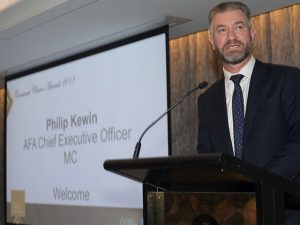Riskinfo joined with the AFA, Zurich Financial Services and financial advice representatives to discuss the road ahead for advice after another issues filled year.
During the course of the discussion, the panel unpacked some of the issues covered by the Royal Commission, as well as those it overlooked and the wider lack of understanding around life insurance advice and commissions.
Read on to find out what your fellow advisers and other industry stakeholders had to say about these issues.

Panelists (L – R)
- Peter Sobels: Publisher, Riskinfo
- Marc Bineham: Principal Adviser, Noall and Co & National President, Association of Financial Advisers
- Kate McCallum: Adviser and Director, MultiForte Financial Services & Grand Finalist 2018 AFA Practice of the Year Award
- Tom Dawe: Principal Adviser, Capital Focussed & Grand Finalist 2018 AFA Adviser of the Year Award
- Troy Theobald: Adviser and Co-owner, Robina Financial Solutions & Grand Finalist 2014, 2015 AFA Practice of the Year Award
- Nathan Taggart: Head of Sales, Life Risk, Zurich Financial Services Australia
- Jason Spits: Senior Journalist, Riskinfo & Editor, Riskinfo Magazine
- Phil Kewin: Chief Executive, Association of Financial Advisers, Co-host (Inset)
Part 1
- Impact of the Financial Services Royal Commission
- Anti-Advice Sentiment
- A Lack of Understanding
- The Future of Commissions
- Commissions Not an Influence
- A Wider Impact
Impact of the Financial Services Royal Commission
For the financial advice sector, it has been hard to avoid the Royal Commission into Misconduct in the Banking, Superannuation and Financial Services Industry, mainly because it has covered many areas revealing problems and failures while doing so.
Yet, it has been the media coverage of the hearings, particularly those dealing with advice and life insurance, and community perceptions of the issues raised that will continue to trouble advisers, life insurers and consumers long after the Commissioner has handed down his recommendations.
As an adviser, Managing Director of Noall & Co, and National President of the AFA, Marc Bineham, has been reflecting on the impact of the Royal Commission and how it has tarred the entire advice profession with the same brush, including those advisers who specialise in the provision of life insurance advice.
“I don’t think there was enough emphasis made on how few advisers are actually doing the wrong thing. If you look at the complaints, it is less than one percent. There are people doing the wrong thing, and I have no problem with the Royal Commission highlighting that, but I would have preferred some perspective to identify the actual size of the problem, rather than the individual cases displayed,” Bineham said.
“Another major concern was the general public didn’t quite understand what we do, especially on the life insurance side, because they find it very hard to differentiate between the direct, the retail and the group channels, and that is the secondary issue I have with the Royal Commission. It went from ‘we don’t understand what you do’ to ‘we don’t like you now but we are still not quite sure why’,” he added.
…the Royal Commission…went from ‘we don’t understand what you do’ to ‘we don’t like you now but we are still not quite sure why’
AFA Chief Executive, Phil Kewin, holds a similar view which he says is reflected in the treatment of financial advice in the Interim Report of the Commission, despite the intensive level of questioning which took place during the hearings.
“I think we were all impressed at how forensically clinical the Counsel Assisting the Commission were in unravelling what seemed to be a never-ending string of negative experiences and the level of detail displayed that only someone who is intimately familiar with the industry would know,” Kewin said.
“Which is why, when the interim report came out, it was disappointing that there was a fundamental lack of understanding of advice, and the role of advisers, and particularly the issue around insurance commission, which was presented as an incentive to advisers and not the mechanism by which they are paid,” he said, adding that it was frustrating that all advisers were being portrayed as dishonest and charging fees without providing services.
In considering the impact of the Royal Commission’s hearings within the general community, Kate McCallum, adviser and co-owner of MultiForte Financial Services, said it was important to keep in mind that it was, from the start, an inquiry into misconduct, which is a narrow lens through which to view financial advice.

“The platform was not to evaluate the quality of financial advice in the market but to specifically look at misconduct and the methodology was to request from institutions specific examples of misconduct. The light was only being shone on a very narrow lane way and that is the message that has not been represented in the media, and so consumers are seeing this as a representation of the rest of the community,” McCallum said.
“There was a fabulous quote that the Hayne report was ‘high on outrage and low on detail’. I got about two thirds of the way through and put it aside until we get to the recommendations. The other thing we forget is this is going on around the world, and there is regulatory change in the UK and the US and a broader social shift around the expectations of institutions. It’s beyond financial advice, it just so happens that we are in the spotlight at the moment,” McCallum noted.
Anti-Advice Sentiment
Troy Theobald, adviser and co-owner of Robina Financial Solutions, believes that at present anti-advice sentiment is popular and sells newspapers and books but undermines the work of financial advisers and discounts the value of advice.
“Article headlines and high-profile books that tell consumers they don’t need advice or advisers, and they should never pay commissions or even use a product provider is the type of sentiment that is resonating with the community. Advice clients are being told via industry funds advertising that the retail sector is only trying to line their own pockets, which is anti-advice, and it creates a perception, based on a handful of cases, that turns people away from advice,” Theobald said.
He was also concerned that the lack of awareness related to financial advice may lead to further regulatory burdens for advisers who have, in most cases, complied with the changes required under the Future of Financial Advice and Life Insurance Framework (LIF) reforms.
“The issue is what will come out of the Royal Commission, so we are all jumping at shadows at what may be put in place, but what is currently in place is already so onerous for an adviser who is abiding by the rules. If you are doing things by the rules it is a massive process and time cost but the public perception is that you see a client, flash a PDS before them, and earn five grand,” Theobald said.
Kewin pointed out that it was not the clients of advisers who were unclear about the role, or value, of advice but the 80 percent of people who don’t get advice and have not been educated about the advice process, and will continue to avoid seeking advice due to the reputational damage stemming from events like the Royal Commission.
The issue is what will come out of the Royal Commission…but what is currently in place is already so onerous for an adviser who is abiding by the rules
This has been the experience of Tom Dawe, adviser and Principal with Capital Focussed, who, like Theobald, has to educate clients one at a time but believes the focus of education needs to shift to industry regulators.
Dawe, who was a Grand Finalist in the 2018 AFA Adviser of the Year Award, sees value in the life insurance advice sector becoming pro-active in educating regulators with a program of messages from people who hold life insurance, had a claim assessed and paid, and the work of the financial advisers through that process.
“Education to the wider public is required because we can educate our own clients, but that is only a small percentage of the people that potentially need cover. We need to get on the front foot quickly and do that because if we don’t we’re going to end up with more regulation issues,” Dawe said, adding that he felt it was unfortunate the advice sector had to tell regulators what they should already know about the areas they oversee.
McCallum told the panel that prior to becoming an adviser she ran superannuation master trusts, which included life insurance, and was confident of her knowledge in those areas but learnt how complex the advice process was after shifting roles.
“When I moved into advice the things that I thought I knew were very different from what I had to do in practice. From the outside, it is difficult to understand the reality of taking someone through an insurance process unless you are in the position of advising clients, dealing with them when they tell you they have been diagnosed with cancer and you are the one who has to take them through the claim,” McCallum said.
“The regulator cannot fully understand really what that is about… it is challenging for anyone to understand the value of advice until you sit there and you go through it, and it changes your world. It would help us enormously for all of our regulators to have a more intimate view of what goes on in advice, and what the process involves and what it costs,” she added.
A Lack of Understanding
The need for greater understanding also extends to the products that are currently on offer in the area of life insurance, with Kewin noting that while the Royal Commission identified problems in some types of products it made no distinction between what is offered through direct, retail and group life channels.
“One thing that came out of the hearings was the identification of the poor claims paid ratio on some products, particularly in direct insurance, that the PJC Inquiry into life insurance failed to identify. Unfortunately, people just hear the words ‘Insurance not paid’ and ask why should they pay a premium if it is not going to get paid out,” Kewin said.
“The message advisers get across to the people they sit in front of, and are able to educate, is that if I recommend a product for you there is a greater chance of getting better value for money, of definitions that are suited to you and will be paid out at claim, and a product that is tailored to your needs. Yet, this is counterintuitive to the current buying psychology where many people think if I go direct and do my own research, I’ll get a cheaper rate and better deal. Life insurance doesn’t work that way,” he remarked.

Bineham sees the lack of understanding about different life insurance products, and the lack of advice in the insurance buying process, leading to consumers stepping away from holding any cover at all, a situation which was also observed by Nathan Taggart, Head of Sales, Life Risk at Zurich Financial Services.
“What was not really highlighted was how engagement with insurance can be maintained where education and advice is involved. That is where you build a relationship and when people admit they are struggling and want to drop their life insurance the adviser can be involved, and instead of cancelling the policy look at how to help them and remind them of the reason they initially looked for cover that was tailored for them and their family,” Bineham observed.
Reflecting on Bineham’s comments, Taggart said there was a tendency among some industry observers to overstate the extent to which people were willing – or able – to self direct their life insurance affairs.
“Some of the issues around the direct channel at the Royal Commission were less about the products and more around the way they were sold to clients. We are firm that consumers can have choice on the product they can get and the channel they use, but we need to give them the tools to ensure they are making as informed a decision as possible.
“We are also looking to where we go from here, in terms of the Royal Commission, and we’re concerned about calls for increased regulation, which creates more red tape, and leads to increased cost of service for advisers. We are concerned because we need a robust and viable advice profession in order to deliver a well protected and informed community, and we would prefer the Commission did not reduce the accessibility of advice by making it a more expensive or complex process.
The Future of Commissions
Chief among the issues raised, not in the Interim Report but in a Policy Discussion Paper following the round of life insurance hearings, was a consideration to ban life insurance commissions altogether. The panel noted this proposal seemed to overlook the changes currently taking place as part of the LIF reforms.
At the same time, the panel was also concerned over some of the views about life insurance commissions made by the Counsel Assisting, as well as views held by industry representatives which did little to refute or correct misconceptions around the role and purpose of commissions.
At the time of these events, the AFA released a statement outlining how life insurance commissions have long been a mechanism to pay for related advice and under the LIF reforms almost all incentives to churn product had been removed (see: Commission Concerns Overlook LIF and Best Interest Duty).
Kewin told the panel the AFA’s position was that advisers should be able to charge fees, commissions or a combination of both for their advice services, and that choice ensures financial advice remains accessible to more Australian consumers.
“We felt that the comments made at the Royal Commission did not accurately represent the roles of life insurance commissions in that they were not a mechanism to influence the selection of a product, but enabled clients to access affordable advice for life insurance. It is even more true now under LIF where all insurers pay the same commission and that was the point we wanted to raise in response to statements made during the hearings,” Kewin said.
There was also nothing in the hearings that demonstrated that someone had been disadvantaged, or given bad advice, as a result of insurance commissions
For Bineham, the Royal Commission also failed to recognise that much of what it was examining was past behaviour that had been recognised and that steps had been put in place to deal with any concerns.
“The way that commissions and their use by advisers came across was that this was all new, whereas we’ve actually got the LIF legislation in place that has addressed this and we’re in the middle of seeing how that is going to affect the industry in a report due in 2021. We’ve had reviews, inquiries and changes to regulations and the Royal Commission did not recognize there was actually anything in place, or that any changes had been made,” Bineham said.
“There was also nothing in the hearings that demonstrated that someone had been disadvantaged, or given bad advice, as a result of insurance commissions. It didn’t even feature in any of the examples of poor advice that came up over the course of the hearings,” he noted.
Adding to Bineham and Kewin’s comments, Taggart said Zurich looked at how advice was remunerated in other markets and continued to support the use of commissions with life insurance advice.
“We have been clear on this for a long period of time and we remain pro-commission and support the right of consumers to pay for their life insurance advice via a commission rather than an out of pocket fee. We looked at other developed markets globally and the overwhelming majority still see commission as the most viable way of consumers paying for life insurance advice a,” Taggart told the panel.
Commissions Not an Influence
McCallum said that commissions were not an influencing factor for her business, as life insurance was usually provided as part of a holistic advice plan on a fee-only basis. However, she believes they should remain an option for consumers to pay for life insurance advice and products.
“What I hear being expressed around the table is a move away from a model that is adviser valued to a model that is client valued – which doesn’t necessarily mean a ban on commissions – but allows to client to state ‘this is who I am, this is what I need, and I prefer to be able to pay for my services in this way’,” McCallum said.

“The fundamental issue is whether the client is being valued and able to access the right ways of executing advice. We can deliver that advice, but still need product to execute it. If the way a client chooses to access that advice and the product that implements it is via commission, then I’m absolutely fine by that,” she added.
As fellow advisers, Theobald and Dawe remarked that commissions had little impact when working with clients or placing business with an insurance provider, and instead they were motivated by ensuring clients were able to gain cover, or keep it for the long-term.
Theobald said his practice would never start from the position of product or commission and instead used needs analysis and a fact-find to gauge the level of cover relevant for each client, and then considered which options, in terms of products, would meet those needs.
“The last part of the process produces how much we get paid, and with uniform commissions there should be no difference. Every client is different and they are paying us to take it out of their hands, if we gave them the true bill of that time cost, the average family isn’t going be able to afford it,” Theobald said.
Dawe added, “Commission levels are now uniform across all insurers so it doesn’t affect our choices. We do need to recognise that if it is removed advisers will only be able to represent the top two percent of people who can afford to accept the fee. The average mum and dad are struggling and they may not have the capacity to pay a separate fee”.
A Wider Impact
Looking at the broader picture, Kewin observed the banning of risk commissions was more than an issue affecting the remuneration of advisers but would create a fundamental reduction in the size of the broader life insurance industry. He noted that advised life insurance business made up more than 90 percent of many life insurers’ business income and its removal would be a fundamental change and a reduction in the size of their business.
“Any change will affect advisers, the small businesses they operate, the people they employ, and their clients who won’t be able to afford to get advice and won’t access advice. As a result of this, there will be more uninsured people, and that will form part of the greater drag on social security and the health system. It’s fundamental that it will push back through the entire economic system and community,” Kewin remarked.
Part of the problem, according to McCallum, is that little nuance has been added to the discussions around commission, which is being treated in a simple binary ‘yes or no’ way, including by the Royal Commission, which appears to be sending a message that commissions are bad and should come to an end.
“The nuances in this are far greater than what we’re hearing. It’s actually an exceptionally complex problem and there are other ways that we can do this,” McCallum said.
“Insurance is actually the original form of crowdfunding and came from a community ensuring that the people around them were going to be okay, but things like the negativity around insurance and the Royal Commission’s lack of understanding of commissions make us forget that insurance started as something useful and beneficial,” she noted.
Part II of our 2018 AFA/Zurich Round Table will be released shortly…











